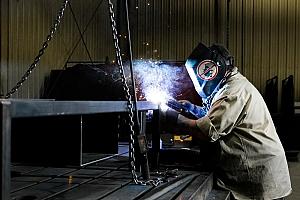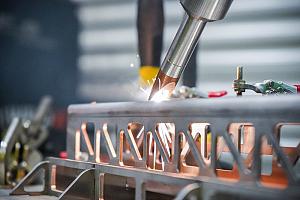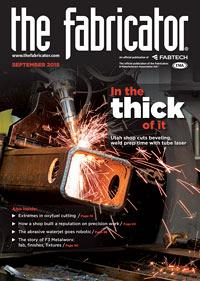Editor-in-Chief
- FMA
- The Fabricator
- FABTECH
- Canadian Metalworking
Categories
- Additive Manufacturing
- Aluminum Welding
- Arc Welding
- Assembly and Joining
- Automation and Robotics
- Bending and Forming
- Consumables
- Cutting and Weld Prep
- Electric Vehicles
- En Español
- Finishing
- Hydroforming
- Laser Cutting
- Laser Welding
- Machining
- Manufacturing Software
- Materials Handling
- Metals/Materials
- Oxyfuel Cutting
- Plasma Cutting
- Power Tools
- Punching and Other Holemaking
- Roll Forming
- Safety
- Sawing
- Shearing
- Shop Management
- Testing and Measuring
- Tube and Pipe Fabrication
- Tube and Pipe Production
- Waterjet Cutting
Industry Directory
Webcasts
Podcasts
FAB 40
Advertise
Subscribe
Account Login
Search
DURMA opens official factory branch in North America
After years of relying solely on a seller network, DURMA opens office in Lake Orion, Mich.
- By Dan Davis
- September 14, 2018
- Article
- Shop Management

Yuksel Taskin, president, Durma North America, stands in the warehouse of the company’s new office in Lake Orion, Mich.
North America continues to be one of the most vibrant spots for modern manufacturing activity in the world. As a result, more international machine tool manufacturers are planting their flags in the ground on the continent to be closer to their metal fabricating customers. Durma has done just that with the opening of its only official factory branch—Durma North America—in Michigan this past January.
Durma is not a new name in metal fabricating circles. The company has sold press brakes, laser cutting machines, punching machines, and shears in North America through a seller network for several years. Deciding it wanted to strengthen its relationship with existing customers and expand its presence in this manufacturing market, the Europe-based company opened a 90,000-sq.-ft. facility, which includes a warehouse, service department, training area for metal fabricating customers, and a complete spare parts department.
The FABRICATOR spoke with Yuksel Taskin, president, Durma North America, to find out just what the company’s formal presence in North America means for the metal fabricating community.
The FABRICATOR: What thinking led Durma to establish a presence in North America after relying solely on a seller network in the past?
Yuksel Taskin: First and foremost, we wanted to ensure that everyone knows Durma North America Inc. is the official factory branch for Durma in the U.S. We are a 60-year-old company with 2,000 employees, and we manufacture about 8,000 machines a year. We sell machines into 156 countries.
We’ve also sold about 2,000 machines in the U.S. over the years. So we want everyone to know that we’re just machine people and we stand behind what we sell.
But even though we sold a lot of machines in the U.S., we felt like we weren't close enough to our fabricating customers. So our focus right now is to help those customers who currently own our machines. We greatly appreciate their business, and we want to be closer to them so we can help with whatever issues they may have. We offer solutions for our customers’ day-to-day operations. We can now help them with training, provide prompt service, and quickly supply them with spare parts. For example, if a problem exists and our service technicians are needed at an end user’s site, our technicians will be on a plane or in a car within hours, and we can get the machine up and running very quickly. This is very important to us.
Just the other day a customer needed a spare part for one of our machines right away. We had the part in our warehouse here in Michigan and sent it directly to the customer. They got it the next morning. The company was so impressed with our ability to take care of them and keep their operations running smoothly that they ordered 10 more machines from us for their new factory.
In summary, our warehouse is full of ready-to-plug-in machines. We set up, test, and pack them up in our facility in Michigan for delivery to the customer. Upon receipt of the machine, the end user will be able to plug it in and start making parts.
FAB: Will you still have distributors?
Taskin: Yes. We’ll be seeking to set up a distribution network that reflects the same dedication to service to our customers that Durma has been practicing internationally over the last 60 years. That's why we are trying to reorganize our distributor network in North America today.
Our distributors in North America now will be supported by Durma’s corporate resources from a local vantage point. Our warehouse has spare parts ready to go, and service technicians are readily available. You can purchase a machine in the morning and have it delivered the same afternoon. Just plug it in, and you should be able to start producing parts.
We also have training in our new facility. Fabricators can come to a comfortable environment and learn about all of our machines. This is very helpful for fabricators looking to boost the skills of their employees.
FAB: Why locate the office in Michigan?
Taskin: It made sense because Michigan is in the middle of North America. Also, Motown is the heart of manufacturing on this continent. We are proud to be a part of the manufacturing culture in Michigan.
What we’ve found in this last eight months is that we’re already outgrowing this new facility.
FAB: From a technology perspective, what can fabricators expect from Durma’s product lineup if they visit the showroom?
Taskin: Fabricators will find the quality, bending, cutting, punching, rolling, fiber laser cutting, and laser tube cutting machines that the company is known for. They will get to see the equipment that’s being used to manufacture cutting-edge products in sophisticated industries such as aerospace and defense.
Our machines are designed so that they can be monitored via smartphone by someone on the other side of the world. These machines can talk to each other, opening up the true potential of Industry 4.0.
FAB: What do you see for Durma North America in the near future?
Taskin:In the coming months, we want to develop a strong distributor network. North America is a big place, and we are looking for like-minded partners. We want distributors that have the same philosophy as Durma; we want them to be customer-oriented, support the sale of a good-quality product, and support customer-pleasing service.
Our future goal calls for building a strong supply base in the U.S. and possibly doing some light production here. That's a goal we would like to accomplish in two years.
Obviously, we’re going to need a bigger facility. As I said earlier, we’ve already started to outgrow this one.
For more information on Durma North America, visit www.durmanorthamerica.com.
About the Author

Dan Davis
2135 Point Blvd.
Elgin, IL 60123
815-227-8281
Dan Davis is editor-in-chief of The Fabricator, the industry's most widely circulated metal fabricating magazine, and its sister publications, The Tube & Pipe Journal and The Welder. He has been with the publications since April 2002.
Related Companies
subscribe now

The Fabricator is North America's leading magazine for the metal forming and fabricating industry. The magazine delivers the news, technical articles, and case histories that enable fabricators to do their jobs more efficiently. The Fabricator has served the industry since 1970.
start your free subscription- Stay connected from anywhere

Easily access valuable industry resources now with full access to the digital edition of The Fabricator.

Easily access valuable industry resources now with full access to the digital edition of The Welder.

Easily access valuable industry resources now with full access to the digital edition of The Tube and Pipe Journal.
- Podcasting
- Podcast:
- The Fabricator Podcast
- Published:
- 04/30/2024
- Running Time:
- 53:00
Seth Feldman of Iowa-based Wertzbaugher Services joins The Fabricator Podcast to offer his take as a Gen Zer...
- Trending Articles
JM Steel triples capacity for solar energy projects at Pennsylvania facility

Fabricating favorite childhood memories

How laser and TIG welding coexist in the modern job shop
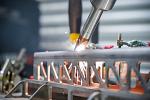
Robotic welding sets up small-batch manufacturer for future growth
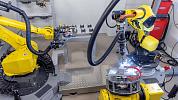
Ultra Tool and Manufacturing adds 2D laser system
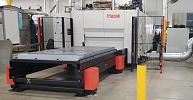
- Industry Events
Pipe and Tube Conference
- May 21 - 22, 2024
- Omaha, NE
World-Class Roll Forming Workshop
- June 5 - 6, 2024
- Louisville, KY
Advanced Laser Application Workshop
- June 25 - 27, 2024
- Novi, MI
Precision Press Brake Certificate Course
- July 31 - August 1, 2024
- Elgin,

